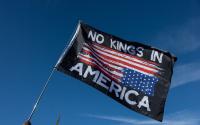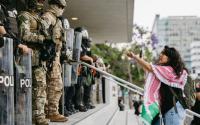Common Dreams / Published on Tuesday, January 18, 2005 by Agence France Presse
Asia's tsunami disaster provided a "wonderful opportunity" for the United States to show compassion with relief efforts that reaped "great dividends" on the diplomatic front, Secretary of State-designate Condoleezza Rice said.
Rice's remarks, made at her Senate confirmation hearing, drew a sharp rebuke from Democratic Senator Barbara Boxer who accused her of insensitivity to last month's catastrophe that claimed some 168,000 lives across the Indian Ocean.
Rice, the outgoing national security adviser, made clear in her opening statement Washington's hope of consolidating its influence in the region, following up on the goodwill generated by US military help and financial aid for tsunami victims.
"Our Asian alliances have never been stronger, and we will use that strength to help secure the peace and prosperity of the region," she told the Senate Foreign Relations Committee that was expected to clear her nomination with little trouble.
US officials have trumpeted the massive military relief effort mounted by the Pentagon as a humanitarian gesture that could score points in a part of the world where anger still lingers from the Iraq war. In response to a question, Rice agreed readily.
"I do agree that the tsunami was a wonderful opportunity to show not just the US government, but the heart of the American people, and I think it has paid great dividends for us," she said.
Boxer, a sharp critic of Rice's work as national security adviser, quickly took the nominee to task over the characterization of the tsunami as a "wonderful opportunity."
"The tsunami was one of the worst tragedies of our lifetime," Boxer said. "And it's going to have a 10-year impact on rebuilding that area. I was very disappointed in your statement. I think you blew the opportunity."
On another topic, Rice signaled that President George W. Bush's administration would work to tighten ties with China, its one-time "strategic competitor," despite criticism of Beijing's human rights record.
"We are building a candid, cooperative and constructive relationship with China that embraces our common interests but still recognizes our considerable differences about values," Rice told the committee.
Her remarks reflected the delicate task facing Washington in dealing with the Asian giant that is expanding its political and economic influence not only in Asia, but in Latin America, Africa and Europe.
The US administration is counting on China to help rein in North Korea's nuclear weapons ambitions. But several thorny issues loom in Bush's second term, including trade, Taiwan and the potential lifting of Europe's 15-year arms embargo on China.
Still, Rice was optimistic, saying: "In Asia, we have moved beyond the false assumption that it is impossible to have good relations with all of Asia's powers."
She called Japan, South Korea and Australia "key partners in our efforts to deter common threats and spur economic growth" and called for unity in insisting that North Korea, as well as Iran, "abandon their nuclear weapons ambitions and choose instead the path of peace."
Rice hailed the peaceful, democratic transfer of power in two Asian Muslim countries, Malaysia and Indonesia, but vowed to work for reform in Myanmar and North Korea, two of the countries she called "outposts of tyranny."
She said the United States was cooperating with India on a range of economic and security issues, while working with Pakistan "as a vital ally in the war on terror and a state in transition towards a more moderate and democratic future."






